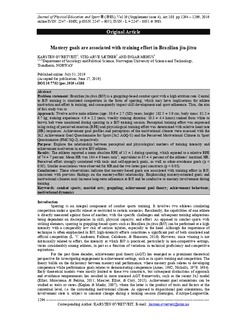Mastery goals are associated with training effort in Brazilian jiu-jitsu
Journal article, Peer reviewed
Published version

Åpne
Permanent lenke
http://hdl.handle.net/11250/2611448Utgivelsesdato
2019Metadata
Vis full innførselSamlinger
Originalversjon
Journal of Physical Education and Sport. 2019, 19 1294-1299. 10.7752/jpes.2019.s4188Sammendrag
Problem statement: Brazilian jiu-jitsu (BJJ) is a grappling-based combat sport with a high attrition rate. Central to BJJ training is simulated competition in the form of sparring, which may have implications for athlete motivation and effort in training, and consequently impact skill development and sport adherence. Thus, the aim of this study was to Approach: Twelve active male athletes (age: 30.6 ± 2.7 (SD) years; height: 182.5 ± 5.9 cm; body mass: 81.2 ± 6.7 kg; training experience: 4.6 ± 2.2 years; weekly training duration: 10.3 ± 4.4 hours) ranked from white to brown belt were monitored during sparring in a BJJ training session. Perceptual training effort was expressed using rating of perceived exertion (RPE) and physiological training effort was determined with relative heart rate (HR) responses. Achievement goal profiles and perceptions of the motivational climate were assessed with the 3x2 Achievement Goal Questionnaire for Sport (3x2 AGQ-S) and the Perceived Motivational Climate in Sport Questionnaire (PMCSQ-2), respectively. Purpose: Explore the relationship between perceptual and physiological markers of training intensity and achievement motivation in active BJJ athletes. Results: The athletes reported a mean absolute RPE of 15 ± 1 during sparring, which equated to a relative RPE of 74 ± 7 percent. Mean HR was 164 ± 9 beats·min-1, equivalent to 85 ± 4 percent of the athletes’ maximal HR. Perceived effort strongly correlated with task- and self-approach goals, as well as other-avoidance goals (p < 0.05). Similar associations were observed for HR and the two latter goal constructs (p < 0.05). Conclusions: These observations indicate that mastery-based goals are associated with training effort in BJJ, consistent with previous findings on the mastery-effort relationship. Emphasizing mastery-oriented goals and motivational climates may increase long-term adherence to BJJ and be conducive to mastery involvement during training.
